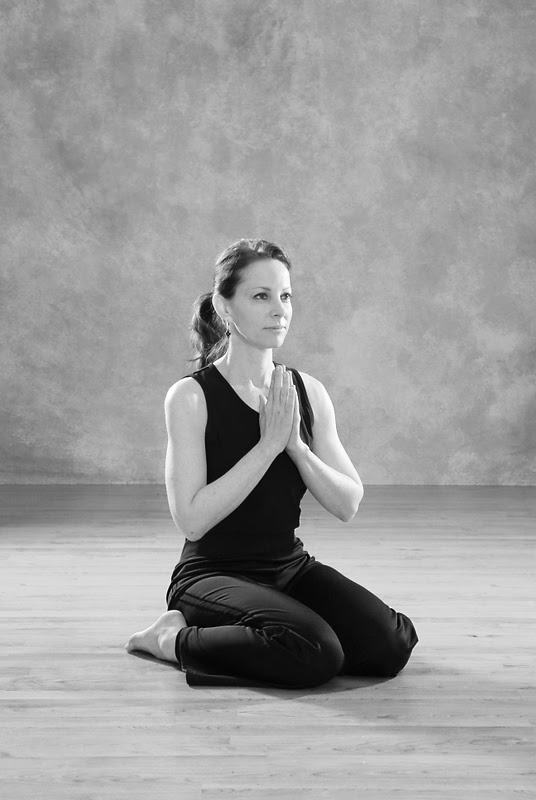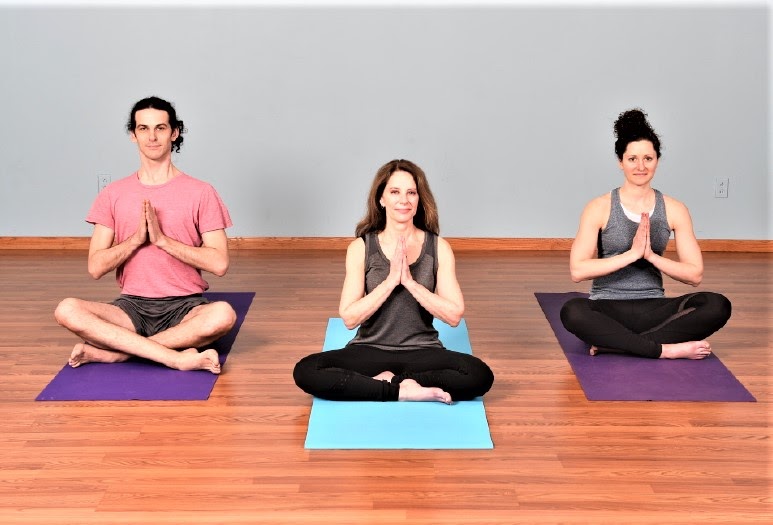Guest post written by: Nancy Gerstein, RYT 500
The fact is, yoga’s mental and spiritual benefits far outweigh the physical exercises that have become synonymous with the practice.
I started practicing yoga not because I wanted to, but I had to, I needed a PE class to graduate college. My soft-spoken, long-bearded yoga professor dressed in a white robe and turban did not teach even one sun salutation, inversion, or downward dog. He would demonstrate a pose at a time, then rest between each one.
As a college senior, the class, a welcome relief from creeping graduation anxiety, instantly became my favorite, and by the end of the semester, I felt a shift in the way I went through my day. I was calmer. More thoughtful. Less anxious. Even – dare I admit it – happier?
Years later, I discovered that yoga embodies a plentiful, systematic philosophy that includes, according to the Yoga Sutras, the goal of “liberation from all suffering”.
There’s a lot to absorb in its rich philosophy, but one of the most important yogic teachings is that the path to personal liberation (moksha) includes living the five Niyamas (nee-yuh-muhs ) or observances.
Holding the Wisdom. Yoga’s ancient spiritual teachings encompass a vast terrain of wisdom that’s incredibly practical, no matter who you are, even in today’s uncertain, ever-changing culture.
The five Niyamas are personal rules of behavior that help keep us in check, offering guidelines to live a more balanced, joyful, productive, and satisfying life. If you want to make lasting life changes, and do it in your own way, yoga’s Niyamas can be a rewarding place to start.
The Niyamas describe the practical tactics that encourage a natural state of joy and clarity. They’re not intended as strict or static rules, rather they’re suggestions and ideas designed to be fluid, adapting as you adapt, and ever-changing as you are. Through practice and discipline, you’ll find yourself slowly unraveling like a blooming flower.
Let’s take a deep dive into each Niyama, so you can bring them into your consciousness and live the life you’ve always wanted.
Niyama 1: Saucha (Purity)
Saucha encourages us to eliminate anything we may feel is toxic in our body, mind, spirit, or environment. This also refers to the energy of the people in your life, which affects your state of mind, thus hindering or inspiring your spiritual path.
This Niyama also encourages a non-judgmental (clear) mindset. For instance, instead of seeing situations out of your control as toxic, focus on the things in your life that nourish your consciousness, like the energy in your home, office and car, the activities you engage in, and the people you surround yourself with.
The Practice – To purify your body and mind, practice yoga, pranayama, and meditation. Saucha practices fortify your ability to let go of anything that’s impure, while it creates a truer starting point (think data point) each time you do your practice. Say you just had an argument with a friend. If you absorb the negatives of an argument, much like taking out the trash, those impurities need to be mindfully released during your next practice.
Practice Saucha at home by donating or tossing anything that you no longer use, causes clutter, or inhibits energy to flow through your space. Clear your kitchen counters, coffee tables, and work areas. Cleanse the energy in your home with smudge blessings by burning white sage. A clean and clear physical environment leads to a calmer mind.

Niyama 2: Santosha (Contentment) Living in a state of Santosha means we find contentment and the blessings of our life wherever we are. Even with a job we dislike, an apartment that’s too small, and a love-life that’s far from happy.
Santosha invites us to abandon patterns of trying to control other people and outcomes, and instead settle into centered awareness, or as my teacher calls it, “okay-ness”. Many of us tend to think of contentment as the fulfillment of desires, but yoga teaches that this kind of bliss is short lived. Desire builds on itself, creating more desire and even more cravings. Like a well that can never be filled, greed (wanting) is a vacant search for happiness.
Think about all the happiness beliefs you’ve told yourself, like When I get a new car, I’ll be happy, or After I take a vacation, I’ll be happy or Once I’m married, I’ll be happy. Was it true? If so, how long did you stay happy?
The yogis view of contentment is to accept whatever life brings in the moment.
The Practice – Bring Santosha into your consciousness by first looking at your own toxic thoughts and behaviors. The key is to observe without judgment. Santosha asks us to see things as they truly are, not how you think they are. Start by letting go of wishing that things were different, even when they’re not ideal. You’ll discover a natural attitude of gratitude, and with daily practice, your life’s blessings will take over your negative thought patterns, thus cultivating contentment.

Niyama 3: Tapas (Discipline) Tapas is the willingness and actions taken to reach one’s goal. Tapas implies austerity, sacrifice, and the discipline or “fire” which incites transformation. According to yoga philosophy, the fire that’s created through yoga practices destroys impurities in one’s consciousness and leads to control of the body and its senses.
You know that internal drive that pushes you to do something that’s good for you, even when you don’t particularly feel like doing it? That’s Tapas. To induce lasting change on any level, whether it’s to lose weight, master the splits, or get along with your partner, it’s essential to have the discipline to do it: you must commit to Tapas.
Tapas practice involves eliminating distractions and obstacles, including your own negative thinking so that your full attention is on your goal. You might begin by observing the quality of action that you bring to an activity. How often do you dedicate 100 percent of your focus to something?
The Practice. It’s the Tapas fire that brings you back to the mat or meditation seat, encouraging you to practice deeper, learn more about yourself, and move forward. Tapas practice is based on creating a strong and clear foundation from which the other Niyamas can unfurl. Eating healthy, organic foods; committing to daily movement; getting to sleep by 10 pm and waking at sunrise; and allocating time to sit in silence are some of the disciplined daily practices that establish the groundwork for a healthy habits. If you don’t know how to make your goals a reality, just start where you are. Tapas is also the will to find the way.

Niyama 4: Svadhyaya (Self-Study) It’s often said that when our knowledge and experience come together, it gives birth to inner wisdom. Svadhyaya is the honest, introspective study of the self. Sans negative self-talk, this inquiry includes the ability to see our shortcomings so that we can improve and grow into better human beings.
Svadhyaya also encompasses learning something new every day. Attending spiritual talks, mediating, journaling, watching educational Youtube videos, and reading inspirational literature are common practices of those who are engaged in self-inquiry.
The Practice Svadhyaya asks the practitioner to literally pause, breathe, relax, feel, and learn to enjoy the spirit of their own exploratory adventure. You can practice self-study anytime, even right now. Simply add mindfulness to this moment. Every movement is asana, every breath is pranayama, and every thought is meditation. Notice the tone of your voice and body language when you speak to family and friends. How does it differ from the way you engage coworkers, customers, or strangers? Does your body feel as if it’s wide open and available, or are you shut down and introspective in either situation?
Niyama 5: Ishvara Pranidhana (Surrender to the Divine)
Ishvara Pranidhana translates to “surrendering to the divine spirit”. This observance is described as honoring and surrendering to a higher ideal or consciousness. Yoga philosophy suggests that by uniting your individual self with that of a higher divine principle like Buddha, Jesus, Mother Nature, or (fill in the blank), all egotism, trivialities, and selfishness are removed. When you surrender your ego-driven activities to divine spirit, doorways can open for positive energy to flow into all areas of your life.
Ishvara Pranidhana redirects energy away from selfish desires as you learn that you’re a fragment of something much bigger than trivialities like your job or body shape.

The Practice: As an exercise in building your relationship to a force much bigger than yourself, choose a place in your life where you feel utterly stuck or anxious. Then, instead of asking your higher force to solve your problems and grant your every wish, ask for the need to fix it, solve it, or control it to be lifted off your heart. Surrender that problem and ask for stress and stuckness to be replaced with peace and understanding.
Start With Self-Awareness. Most Western yogis begin to practice the Niyamas when they see that no matter what we “get” in the way of material goods and desires, they will never provide us with real happiness.
For the Niyamas to bring us daily guidance, helping us create a positive internal environment to live our most authentic, balanced, spiritual, physical, and emotional life, the practice begins with self-awareness. That may be the real beauty of the Niyamas, they’re personal interpretations and the journey is left up to you.
To walk safely through the maze of human life, one needs the light of wisdom
and the guidance of virtue. —Buddha
About Nancy Gerstein, RYT 500
Yoga and meditation teacher, author, and entrepreneur, Nancy Gerstein is the founder of Motivational Yoga, the “Yoga Fuel for Life” that helps empower and clarify one’s life decisions, goals, and results. A Nancy’s teachings embody a self-motivating charge through spiritually strengthening practices that bolster personal growth and action development. Her classes feed body and mind, encouraging students to make conscious choices about how they direct thoughts, energy, and focus to live the best live they can.

Nancy is the author of three books including Motivational Yoga: 100 Practices for Strength, Energy, and Transformation and Guiding Yoga’s Light a go-to reference book for yoga teachers and students. She has contributed to numerous publications including Yogi Times, Elephant Journal, Yoga Magazine, and Pop Culture. Visit Nancy at MotivationalYoga.net, follow Motivational Yoga on Facebook, Instagram, and Twitter, and contact her at [email protected]
- FDC – Giejo Magazine Article - July 29, 2023
- MoriMa Tea the – Chinese tea culture - April 26, 2023
- Missionary Position – Least Likely To Bring You To Climax - April 7, 2023






